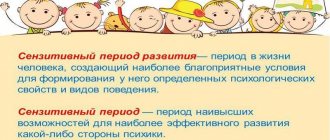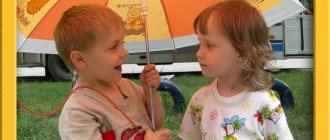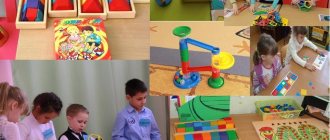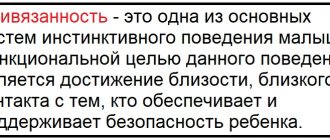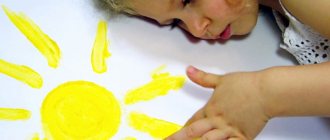Pedagogical stimulation of self-development of preschool children
PEDAGOGICAL STIMULATION OF SELF-DEVELOPMENT IN PRESCHOOL CHILDREN
,
methodologist GOU SPO YaO
Yaroslavl Pedagogical College
The ability to feel the joy of life and freely express oneself is laid down in childhood and remains for many years. Of course, we need to teach and raise children, but in such a way that they can retain a sense of their own will, their own choice. The world in which a preschool child lives is filled with content that children show interest in understanding. This world is multifaceted, diverse, sometimes contradictory and ambiguous.
The modern younger generation, including preschoolers, is socialized in a qualitatively different environment than the previous generation. If before this, for decades and even centuries, the process of education was carried out in a controlled and predictable environment, today, along with the real world, a virtual world has appeared, in which its own laws apply, and control by adults in this world is very conditional. We are witnessing that the media provides children with an abundance of images of base aspirations and values. How to protect children from this? One of the ways to solve this problem is to involve children in associations of the additional education system as much as possible. The Concept for the Development of Additional Education for Children states that “the key sociocultural role of additional education is that the motivation of the internal activity of self-development of children and adolescent subcultures becomes the task of the whole society, and not of individual organizational and managerial institutions: kindergarten, school, technical school or university. It is in the 21st century that the priority of education should be the transformation of living space into a motivating space that determines the self-actualization and self-realization of the individual, where the upbringing of a person begins with the formation of motivation for knowledge, creativity, work, sports, familiarization with the values and traditions of the multinational culture of the Russian people.” [1]
It is known that motivation determines the orientation of the individual and the motivation for activity. Self-development and the formation of a person’s success entirely depend on the formation of the motivational sphere. The period of the most intensive formation of the motivational sphere is preschool age.
It is in the preschool period that motivational mechanisms begin to form, motives change, and their hierarchy is built (as the main new formation of preschool childhood).
The leading type of activity during this age period – play – contributes to the development of the child’s motivational sphere. It also develops thinking, imagination, helps to master social roles, and so on. Now, unfortunately, children's play is being reduced. The child does not play those traditional games as we imagine them. This is a big problem for families, because parents do not support the child’s play activity, and for the modern preschool education system. They begin to teach the child, he loses the opportunity for active behavior and play. And if there is a game, then very often the teacher or educator plays, and the children watch it. Therefore, a very serious requirement has been put forward to the Federal State Educational Standards of preschool education - to return play activities and the status of developmental play activities for preschoolers.
Regarding the concept of self-development, it should be noted that this is a necessary personality quality. A person capable of self-development has enormous educational potential. The motive of self-development is an important motive that encourages an individual to work hard and develop. According to A. Maslow, [5] is the desire to fully realize one’s abilities and the desire to feel one’s competence.
The main guarantee of the successful development of the motivational sphere and self-development of preschoolers is the teacher who is directly involved in the education, upbringing and development of children, his competence and professionalism, the skillful and correct use of pedagogical stimulation.
In pedagogy and psychology there are a number of ways and methods of pedagogical stimulation.
The weakest external influence on a child’s decisions is a direct prohibition of some of his actions, not reinforced by other additional motivators, although adults most often pin their hopes on this type of influence.
Punishment also has a weak stimulating effect (in dealing with children, this is, first of all, exclusion from the game). The child’s own promise is still weak, which indicates the instability of his motivational attitudes. Therefore, the point of view is expressed that demanding promises from children is not only useless, but also harmful, since they are not fulfilled, and a number of unfulfilled assurances and oaths reinforce the formation of such negative personal qualities as lack of commitment and carelessness.
The most powerful stimulant for a preschooler is encouragement, praise, and receiving a reward.
The conditions that ensure the process of holistic development of the motivational sphere and self-development of a preschooler, in which the methods and methods of pedagogical stimulation work effectively, are:
— creation of an emotionally positive microclimate, a friendly atmosphere that ensures a transition to mature and humane relationships between the teacher and children;
— creation of a subject-spatial environment, enrichment of content and non-standard forms of educational activities;
— providing situations of success for each and all members of the children's community, which contributes to the high involvement of the preschooler in the learning process;
— inclusion of the competent pedagogical influence of a teacher who is able to diagnose and predict the child’s personal growth;
— humanization of pedagogical communication between the teacher and students, promoting the interpenetration of personal influences, openness, trust, ensures an emotionally positive mood in the activity;
— the humanistic nature of communication and interaction determines the formation of a single emotionally positive space in which the learning process, enriched with spirituality and mutual understanding, unfolds;
- a teacher who knows diagnostics is able to obtain and constantly enrich the depth of ideas about his students as subjects of educational activity;
— a developing subject-spatial environment that performs an informative function, provides the basis for personal culture and a field of amateur activity for a preschool child;
— the use of non-standard forms of teaching in the subject-spatial environment, which cause a reaction of emotional contagion, promotes enthusiasm, and, consequently, holistic self-realization of the preschooler.
— the successful activity of a preschooler is a universal condition for the development of the motivational sphere and self-development, where the child gains the experience of expanded self-awareness, anticipating his capabilities. Success is associated with an emotional experience that allows you to realize your involvement with the world; success “inspires”, increases self-confidence, and actively stimulates personal growth.
The main thing is that the more the teacher in the classroom arouses interest in active behavior and knowledge, the more actively children, under the guidance of an adult, engage in search activities and stimulate their self-development.
Thus, the successful formation of the motivational sphere and self-development of the child’s personality largely depends on pedagogical influence, on a number of conditions created by the adult; the development process must be structured in such a way that it simultaneously stimulates the course of the child’s self-development.
Bibliography
1. Altunin, and the motivation of children’s social behavior: theories of the development of motives and motivation of social behavior. [Text]: Monograph: educational and methodological manual /. – Moscow: – 2005.
2. Belkin, age-related pedagogy [Text]: Textbook for students of pedagogical educational institutions /. – M., Academy, 2000.
3. Concept for the development of additional education for children. Order of the Government of the Russian Federation dated September 4, 2014 [Electronic resource] – Access mode: – https://www. consultant ru
4. Maslow, A. Motivation and personality [Electronic resource] – Access mode: https://royallib. ru/book/maslou_abraham/motivatsiya_i_lichnost. html.
5. Siegel, E. How to raise a preschooler. [Text] / E. Siegel. – M.; ROSMEN, – 1998.
6. Federal State Educational Standard for Preschool Education [Electronic resource] – Access mode: https://www. consultant ru
7. Bristles, and individualization in childhood. [Text]: textbook / A. M. Shchetinina. – Veliky Novgorod: NovSU named after. Yaroslav the Wise, 2004.
Conditions for self-realization of children
Currently, scientists are unanimous that each individual has a huge variety of capabilities, which are stored in the form of inclinations and, under certain conditions of development, they can be self-realized.
The development of children's self-realization is influenced by many factors: socio-economic, biogenetic, pedagogical. Unfortunately, the misconception of an individual, especially a young one, is the underestimation of inherent natural abilities.
An important condition for children’s self-realization is the creation of situations of success by adults. Words such as “good”, “let’s work some more”, “well done” should be constantly addressed to the child, and every child’s activity needs friendly support. Only such conditions will create a situation of success.
Psychologists have noted that the more actively a child develops creatively, the more productive his thinking functions in different planes and directions.
Leisure is a stimulus for the creative development of children, the flourishing of their abilities, the expansion of the range of interests, as well as the humanization of thoughts, actions, feelings, and creative activity.
Most wealthy people suffer from a lack of things that they are unable to recognize or understand. It is very important for a person to find his place in life in order to feel complete satisfaction from reality, while maximally expressing himself and using all his natural inclinations. A person who uses his resources for the benefit of society is the happiest.
Self-realization includes enjoying the process of work. Self-realization has a close relationship with social evaluation. People often suffer because others do not see or appreciate their positive qualities. Self-realization can allow each individual to appear before society in the brilliance of their capabilities and talents. The ability to direct your bad and good character traits to achieve goals is always valuable in society. Individuals who realize their potential are always loved and respected.
Psychologists believe that the emergence of a mass youth movement, for example, hippies or punks, appeared as a result of an unsatisfied need to find oneself. Therefore, the task of parents is to provide those conditions that will contribute to children's self-realization, bringing to life something new and unknown focused on creativity.
Deviations in the behavior of adolescents are noted in defects in education. The inability of adults to interest a child, as well as to reveal his abilities and capabilities, leads to the fact that random circumstances, as well as spontaneous bursts of energy, begin to control him.
Features of self-awareness
Self-awareness is a child’s understanding of himself, his qualities, and relationships with the surrounding reality. The most striking form of self-awareness is considered to be self-esteem, the way a child evaluates his achievements, personal qualities and capabilities. Initially, the baby does not have the opportunity to evaluate himself, so he uses the position of others. So, if the mother constantly tells the child that he is doing well, this is the position that will be imprinted on him.
In addition, the preschooler’s self-awareness should include:
- understanding of one’s gender (the child recognizes himself as a boy or a girl) and appropriate behavior;
- understanding one’s place in the world, one’s own social position, this most often happens by the beginning of primary school age. A child entering first grade already clearly understands that he is a school student.
The child develops new values and experiences, his inner life becomes more complicated, his actions and behavior change. It is very important to help him in this difficult process, since only in this way can the baby become an equal member of society.
Most often, those children who attended kindergarten have high self-esteem, since their activities were coordinated by a professional teacher and directed in the necessary direction. However, the role of a teacher does not negate the importance of communication with parents, relatives, and the environment.
What can motivate
How can parents find out what can motivate their child? Everything is simpler than it seems. It is enough to look at the world through his own eyes. Understand what attracts and fascinates him, what areas are easy, what he is an ace at.
When a person is interested in something, he tries to make an effort to get the desired object. Children are no exception. Therefore, knowing the interests of the child, it is enough to simply evoke an internal stimulus. A child can be motivated by:
- goals;
- competitions, overcoming obstacles;
- incentives (not to be confused with bribery);
- support from friends and family.
But it is worth remembering that mom and dad need to concentrate on developing internal stimulus.
Why should parents support the authority of adults in raising children?
